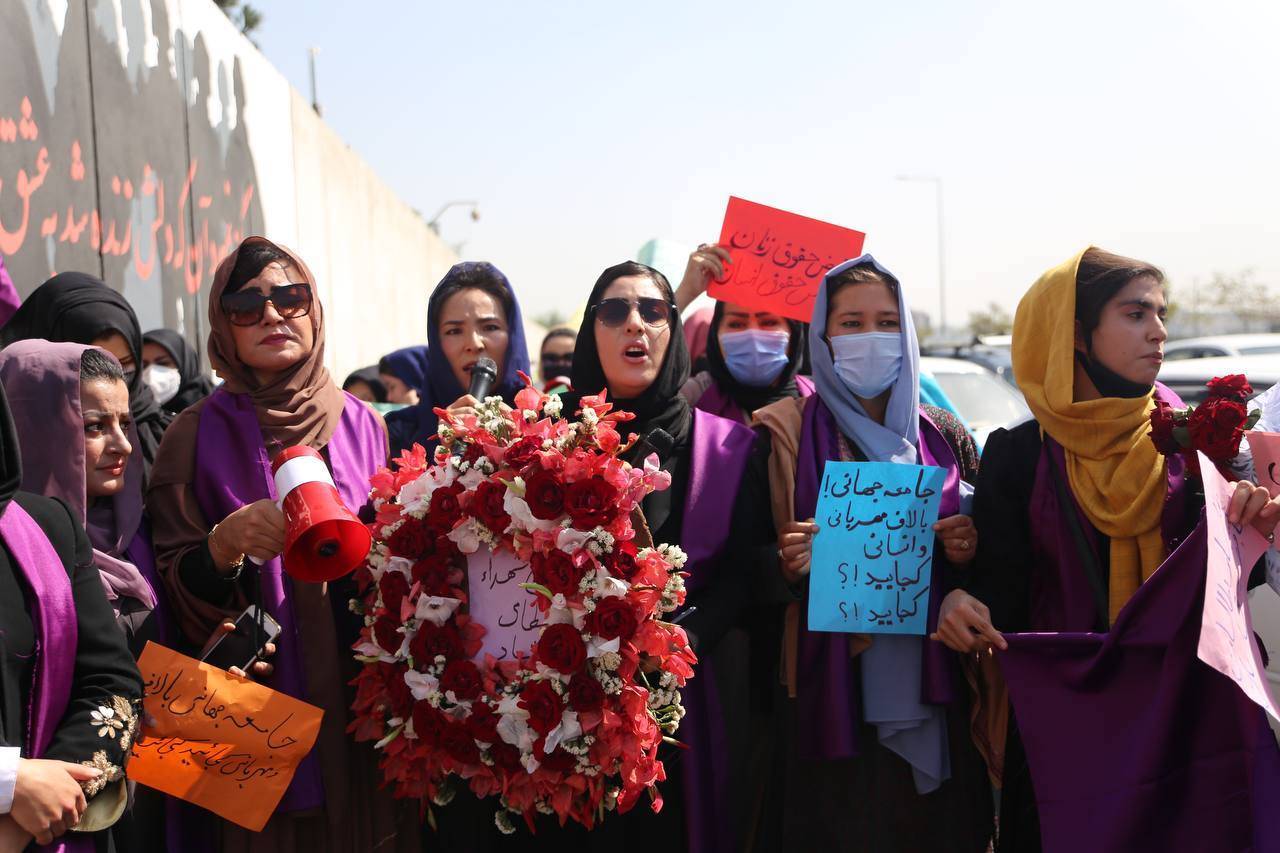Original title: exclusive interview with Afghan legal experts: the Taliban cannot ignore "the rights and interests of half the Afghan population"
Since the Taliban came to power again, all kinds of evidence show that the current situation of women's rights in Afghanistan is still worrying.
Since the Taliban came to power in Afghanistan again, the rights and interests of Afghan women have become one of the topics of global concern.
According to media reports, the Taliban have successively announced restrictions on women's rights and interests, such as prohibiting women from participating in sports activities and women from working with men; There are no female members in the list of interim government officials published by the Taliban; The women's Department of the former Afghan government was replaced by the "Ministry of persuasion and punishment" by the Taliban; Many female protests across Afghanistan were dispersed by the Taliban.

On September 4, 2021 local time, a group of women held a rally in Kabul, Afghanistan, calling on the Taliban to ensure equal rights in the country and allow women to become contributing members of Afghan society. Figure / IC Photo
Mahdi Hakimi, former head of the law department of American University of Afghanistan, said that although the Taliban announced an amnesty and promised to protect women's rights in line with Islamic Sharia law, the situation of Afghan women is still worrying from the perspective of various behaviors after the Taliban came to power again.
Born in Afghanistan, Hakimi is now the executive director of the "rule of law" program of Stanford University Law School. He served as the head of the Department of law of American University of Afghanistan (auaf) from 2014 to 2016. Shortly after the Taliban occupied Kabul, the campus of auaf was closed. The university campus was one of the first sites occupied by the Taliban after entering Kabul.
Afghan women's rights and interests is one of Hakimi's research priorities. Hakimi believes that in the past 20 years, the rule of law environment in Afghanistan has been crucial to helping women exercise their basic rights. Laws such as the procedural law for the protection of rights and the law on the elimination of violence against women in Afghanistan have helped many women to varying degrees.
"If the Taliban want a peaceful and prosperous Afghanistan, they cannot ignore the rights and interests of half of the Afghan population," Hakimi said
The current situation of women's rights in Afghanistan is worrying
Beijing News: what do you think of the current situation of women's rights and interests in Afghanistan?
Hakimi: I'm very worried. The rights and interests of Afghan women were seriously violated during the last administration of the Taliban; Since the Taliban came to power again, all kinds of evidence show that the current situation of women's rights in Afghanistan is still worrying.
The fundamental rights conferred on Afghan women by Islamic law, international law and the Afghan constitution are under threat, including the right to education, the right to employment, the right to equality, the right to participate in public life, the right to individual choice and, more generally, human dignity.
Beijing News: the Taliban promised to protect women's rights in line with Islamic Sharia law. Do you think the Taliban have fulfilled their commitments? Or has the Taliban become more moderate towards women?
Hakimi: I don't think so. The Taliban have become more proficient in public relations means and strategies. However, their practical actions show that the Taliban's attitude towards women's rights and interests is still oppressive in essence.
Although the Taliban have made relevant commitments, their interpretation of Islamic law is very different from that of other Muslim countries, as shown by a series of bans on Afghan women recently issued by them.
Progress in the rule of law in Afghanistan over the past 20 years has helped protect women's rights and interests
Beijing News: how to evaluate the protection of women's rights and interests in Afghanistan in the past 20 years?
Hakimi: Overall, the situation of Afghan women has improved over the past 20 years. During the Taliban rule in the second half of the 1990s, Afghan women had no basic rights such as education, work and participation in public life.
Over the past 20 years, Afghanistan has made significant progress in women's education, employment, health and participation in public life, although there is still much room for progress.
Over the past 20 years, many outstanding ministers, parliamentarians, governors, mayors, judges, lawyers, entrepreneurs, athletes, artists, journalists, scientists, professors, engineers, pilots, ambassadors, leaders of civil society organizations and other important social roles have been born among Afghan women.
It is precisely because of these advances that we are now worried about the possible retrogression of women's rights in Afghanistan.
Beijing News: it is said that the progress in protecting women's rights and interests in Afghanistan over the past 20 years has mainly occurred in cities, not in rural areas. What do you think of this statement?
Hakimi: women in many rural areas of Afghanistan can also enjoy basic rights such as education, employment and medical treatment. For example, in areas inhabited by Hazara ethnic minorities, more girls than boys go to school in many villages. Afghanistan is a complex society and cannot be oversimplified as a gap between urban and rural areas.
Beijing News: you once stressed the significance of Afghanistan's procedural law on the protection of rights and the law on the elimination of violence against women to the protection of Afghan women's rights and interests. Now what do you think of these laws?
Hakimi: no laws or regulations are perfect, let alone laws drafted in unstable conflict areas such as Afghanistan. But these laws do help many Afghan women to varying degrees. For example, the goal of the law on the elimination of violence against women is to prevent violence against women, which is important and moving in the right direction. Overall, over the past 20 years, the rule of law environment in Afghanistan is essential to help women exercise their fundamental rights.
Laws need to be effectively enforced. The law on paper will not magically transform itself into an effective change in society, which requires the political will and ability to implement the law. In the past, both Afghan presidents Karzai and Ghani did not respect the Afghan constitution and the rule of law. In fact, they regarded the country as their private territory. Unfortunately, at present, the Taliban also seem to lack such political will.
The international community should use all means to protect the rights and interests of Afghan women
Beijing News: are the Afghan women you know safe now? How do they view the rule of the Taliban?
Hakimi: they generally feel fear and anxiety about the future. These concerns are exacerbated by the recent restrictions on women's education and employment by the Taliban. That is why thousands of Afghans choose to leave Afghanistan.
Women in many parts of Afghanistan are bravely fighting for their rights through peaceful protests. However, the Taliban resorted to violence to suppress these protests. Afghanistan has changed, and most Afghans do not want to return to Taliban rule in the 1990s. If the Taliban want a peaceful and prosperous Afghanistan, they cannot ignore the rights and interests of half of the Afghan population.
Beijing News: what can the international community do on the issue of women's rights in Afghanistan?
Hakimi: the international community must use all means to protect the rights and interests of Afghan womenIncluding diplomatic, economic, humanitarian and other appropriate mechanisms.
Beijing News trainee reporter Chen Yikai
Edited by Zhang Lei checked by Li Lijun
主营业务:website,cms,wap website

 扫一扫,关注我们最新消息
扫一扫,关注我们最新消息 